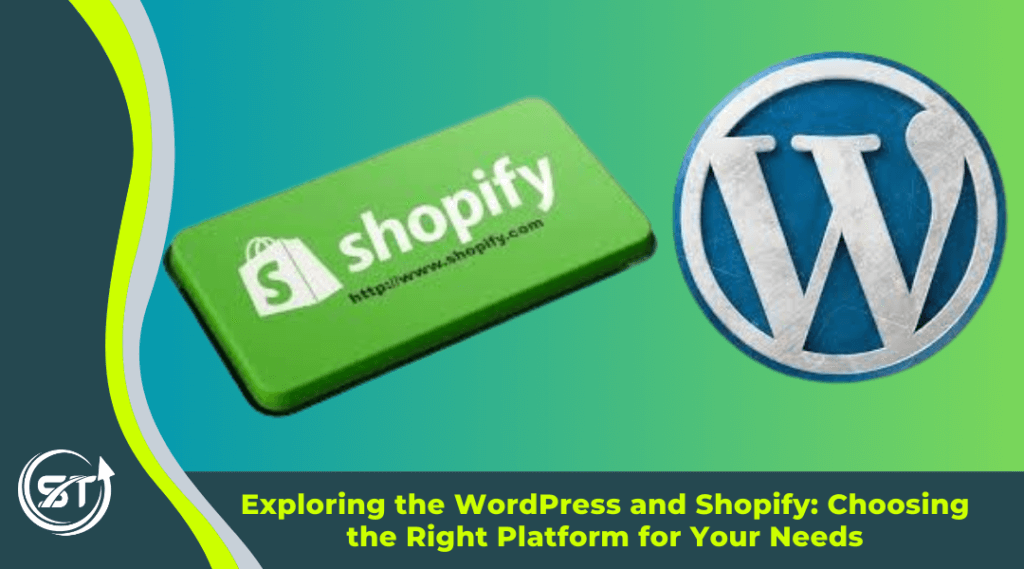
Website creation is not only a task but a great responsibility in the digital marketing field. It is the first impression you give to your customers, which must be attractive, modern and creative. A website gives you a platform to highlight your brand, showcase your products and service offerings, address common customer queries, and make it easier for customers to reach out to you.
Choosing the right platform to build your e-commerce and online presence is crucial if you want to grow your business. There are many different platforms out there that do everything from giving you the ability to sell products to just hosting your digital presence and connecting with customers. WordPress and Shopify are two of the most popular platforms for creating and managing websites. Each is suitable for certain kinds of business needs, and each has special features that make it stand out from the others. Below are some noticeable differences:
Table of Contents
ToggleFoundation and Purpose:
WordPress:
WordPress is a powerful content management system (CMS) for creating and managing websites. Web designers can use it to create beautiful websites. The average user can use it to publish either personal or professional blogs. Millions of people use WordPress to share their stories, showcase their ideas, and connect with friends, family and colleagues across the globe. Over time, it evolved into a powerful platform capable of supporting a wide range of websites, including e-commerce.
Shopify:
Shopify offers an all-in-one eCommerce solution designed for online merchants. Using Shopify, sellers can set up a professional online as it offers a streamlined, user-friendly experience tailored to businesses looking to set up online stores quickly and efficiently.
Easy to Use:
WordPress:
WordPress is known for its flexibility and adaptability, making it the perfect platform for building a website. It offers a myriad of customization options, plugins, and themes, allowing for endless possibilities. While this is great, it can also be overwhelming to new users.
Shopify:
Shopify is an easy-to-use platform aimed at small- and medium-sized businesses. It features a user-friendly interface and a straightforward setup process, making it an excellent choice for business owners without extensive technical expertise. The platform is designed to be intuitive and simple, allowing users to navigate and manage their online stores with ease.
Customization:
WordPress:
WordPress excels in customization. With thousands of themes and plugins available, users have the freedom to create highly personalized websites. This flexibility is ideal for businesses with specific design and functionality requirements. Businesses can trust WordPress to help them meet their unique needs, such as creating a site that can be optimized for mobile devices or includes interactive elements like multimedia, polls and forms.
Shopify:
While WordPress provides a vast amount of customization and theme options, Shopify offers a more streamlined experience. Shopify offers more detailed customization of your e-commerce site, including colour schemes and several layout options. Additionally, you can easily modify the template design to make the store better reflect your brand identity as its adaptive framework makes it easier to navigate and use for beginner users.
Hosting and Security:
WordPress:
Hosting for WordPress websites is self-managed, giving users the freedom to choose their hosting providers. However, this also means that users are responsible for ensuring the security and performance of their websites. Security features such as automatic backups, proper firewall protection and malware scanning can be found with each of the hosting options.
Shopify:
Shopify gives you a hassle-free experience by taking care of the technical aspects of your site, such as hosting and server management. This means that you do not need to be an expert in those areas, giving you more time to focus on what matters most: products, customers and business.
E-commerce Features:
WordPress:
WordPress can be used to power online stores, but it does not have any built-in e-commerce functionality. You need to use a third-party plugin like WooCommerce to interface and achieve advanced e-commerce functionality.
Shopify:
Shopify, being e-commerce-centric, comes equipped with a comprehensive set of features essential for online businesses. These include inventory management, payment processing, and order tracking, creating an all-in-one solution tailored for online retailers.
Cost Considerations:
WordPress:
While WordPress itself is free, there may be costs involved in setting up your website, such as domain registration and hosting. You may also wish to purchase premium themes or plugins that can help enhance your website’s functionality and design.
Shopify:
Shopify is a subscription-based e-commerce platform. It includes all the services you need to create an online store, including hosting, security, and support. Additional costs may arise from transaction fees and premium apps.
Payment Gateway Integration:
WordPress:
WordPress supports various payment gateways, allowing you to choose the one that is best for your business, like PayPal, Stripe, Braintree and more. A built-in plugin system allows developers to easily add new payment gateways and create custom ones when needed.
Shopify:
Shopify Payments is a fully integrated payment gateway that lets you accept any major credit or debit card, Apple Pay, and Google Pay. You will also be able to manage the entire checkout process from the order screen, including adding coupons, shipping methods, discounts and more.
SEO Capabilities:
WordPress:
WordPress is recognized for its SEO-friendly nature and provides powerful SEO tools, making it easy for you to optimize your site. Be sure to choose the correct theme and plugins, as well as stay on top of your SEO efforts to get the best results. Be mindful of a few factors when it comes to SEO: keep your site’s content fresh, update plugins and themes regularly, and make sure the code follows the current standards.
Shopify:
Shopify’s built-in SEO functionality makes it easy to extend your presence. Everything you need is ready out of the box, including customizable title tags, meta descriptions, and clean URLs. You can also easily implement best practices like Schema markup to help get your product pages into Google’s rich results.
Community and Support:
WordPress:
WordPress boasts a vast and active community with abundant resources, forums, and tutorials. Extensive documentation and community support come free with the software, meaning that if you get stuck, you will find answers quickly.
Shopify:
Shopify is our e-commerce platform of choice. It offers an active community and forums for users to connect and share their experiences, making it easy to compare features and find answers to your questions.
Wrapping Up:
WordPress and Shopify are two of the most popular e-commerce solutions available today. Although they differ greatly in terms of features, they both offer a powerful platform for building a successful online store. Top advantages to using Shopify include its user-friendly interface, seamless integration with numerous apps, robust security features, and dedicated customer support. Ultimately, the decision of which one to choose depends on your specific needs and preferences: whether you value content management, user experience and style, speed, security, or low cost.
Also Read: Unlocking Local Success: A Comprehensive Guide to Local SEO












